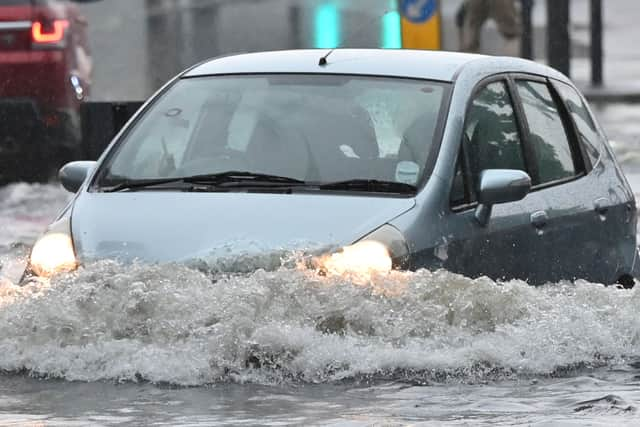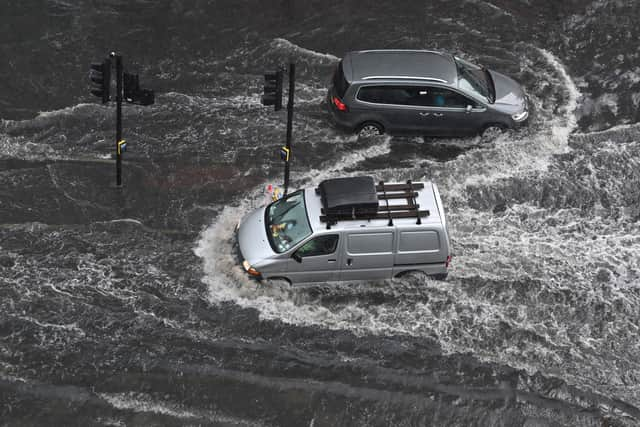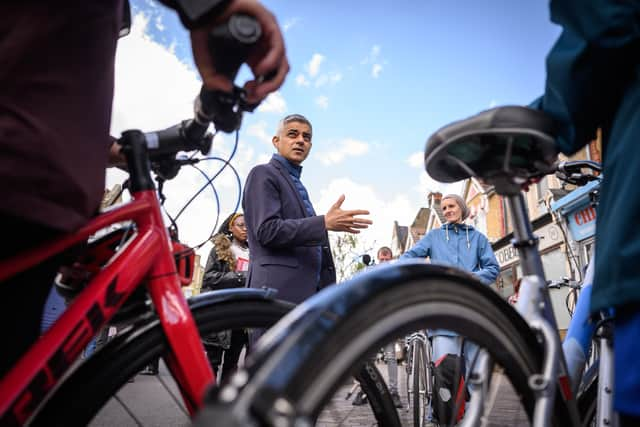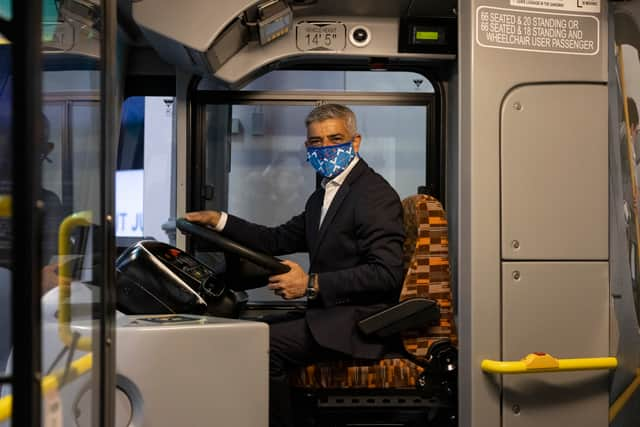Exclusive: Sadiq Khan warns of ‘more frequent and intense’ flooding in London
and live on Freeview channel 276
Flash floods in London will become “more frequent and intense”, Sadiq Khan has warned, as he demanded greater powers from Boris Johnson to deal with the impact of climate change.
Speaking exclusively to LondonWorld, Khan warned the flash flooding seen in London over the summer shows the dangers of global warming “are now moving closer to home”.
Advertisement
Hide AdAdvertisement
Hide Ad“The climate emergency is one of the biggest threats we face today and we need to act fast and decisively,” he declared.
Homes, roads and tube stations were submerged following heavy rainfall in July.
Major incidents were declared at two hospitals after flooding hit the emergency departments at Whipps Cross, Waltham Forest, and Newham.
“The flash flooding we have seen this summer has caused major concern for many Londoners and shows that the dangers of climate change are now moving closer to home,” Khan said.
Advertisement
Hide AdAdvertisement
Hide Ad“Unfortunately, the type of flooding we have seen in recent weeks will become more frequent and intense as a result of heavier rainfall due to climate change.”


Khan called on the Government to devolve more powers and money to help City Hall tackle “both flooding and the wider impact of climate change”.
“To address the climate emergency, we need to reduce energy demand, decarbonise our energy and transportation systems and create a more resilient city that is adapted to the impacts of climate change, such as heatwaves and flooding,” he said.
“To help London go further faster, the government must devolve funding and powers so that I can take more action, which will in turn also create new jobs.”
Advertisement
Hide AdAdvertisement
Hide AdKhan has held further meetings following a roundtable in July with representatives from major water companies, TfL, the Environment Agency and London councils.
City Hall is lobbying ministers to fund support for a “London-wide early warning system” and new schemes to reduce the risk of surface water flooding.
In November, the UK will host the United Nations Climate Change Conference, known as COP 26. This year has seen widespread flooding in Europe, China and the Middle East, with wildfires also taking place in North America, among other incidents.


Road closures
Khan has made the environment a key focus of his time in office.
Advertisement
Hide AdAdvertisement
Hide AdHe declared a climate emergency at the end of 2018 and has pledged to make London a zero-carbon city by 2030.
In his interview with LondonWorld, Khan backed plans to close sections of Oxford Street to through traffic and part-pedestrianise the Strand, arguing it would help revitalise the West End and reduce pollution.
“The West End has taken a huge hit from Covid over the past 17 months and making our high streets cleaner, greener and more attractive is more important than ever to attract visitors and support businesses,” he argued.
Citing analysis by City Hall, Khan claimed improving walking and cycling facilities on high streets could increase retail sales by 30 per cent.
Advertisement
Hide AdAdvertisement
Hide AdHe also said people who walk to the high street spend up to 40pc more a month than those who drive.
The Mayor revealed he would back local authorities which want to close more roads to traffic, such as Hackney Council shutting Stoke Newington Church Street to cars.
“Making it easier for Londoners and visitors to walk and cycle is crucial to delivering a green and sustainable recovery from the pandemic, and I will continue to work with councils to help them achieve our shared bold ambitions,” he said.


Low-traffic neighbourhoods
Khan stood squarely behind low-traffic neighbourhoods (LTNs), where bollards, plants or strategic “point closures” are used to reduce through traffic on residential roads.
LTNs have proved controversial in some boroughs.
Advertisement
Hide AdAdvertisement
Hide AdEaling Council has said it will remove seven LTNs after residents living on roads covered by the schemes opposed them in a recent referendum.
“LTNs complement our wider programme of work to tackle our city’s filthy air, making our roads safer and supporting the increase in walking and cycling seen since the start of the pandemic,” Khan argued.
But Khan also said that LTNs should not be made permanent without consultation.
“LTNs are council schemes. So if a council has brought in measures that aren't working, we’re encouraging them to tweak or amend them.”
Advertisement
Hide AdAdvertisement
Hide Ad

Masks on public transport
In the wide-ranging interview, the Mayor of London reiterated his commitment to mask-wearing on public transport, saying he won’t “stand by and put Londoners at risk”.
“TfL’s frontline station staff and bus drivers will continue to remind passengers that face coverings are a requirement,” he said.
“TfL’s specially trained enforcement officers will continue to run targeted operations and may refuse entry to people not wearing masks and who are not exempt. They will also be able to ask people to leave services for failure to comply with the requirement.”
TFL enforcement officers have stopped almost 212,000 people from entering the network until they put on a face-covering over the past year, according to Khan. Some 3,200 people were ejected from services.
Comment Guidelines
National World encourages reader discussion on our stories. User feedback, insights and back-and-forth exchanges add a rich layer of context to reporting. Please review our Community Guidelines before commenting.
